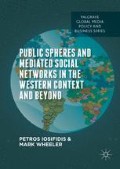Abstract
For many Internet advocates, social media provide an electronic agora to allow a variety of issues to be raised, framed and effectively debated. However, a debate has emerged as to whether the social media are truly a force capable of reconfiguring power relations in terms of economic, political and social organisation. With the fallout from the Arab Spring and online whistle-blowing, difficult questions have arisen—not least of which is whether information technologies have been more effective in mobilising voices of protest than in effecting sustainable democratic change.
Access this chapter
Tax calculation will be finalised at checkout
Purchases are for personal use only
Bibliography
Ackerman, S. 2014. “Snowden welcomes Obama’s plans for NSA reform as ‘turning point’”. The Guardian, http://www.theguardian.com/world/2014/mar/25/edward-snowden-welcomes-obama-nsa-reforms (accessed April 7, 2014).
Barbrook R., and A. Cameron. 1996. “The Californian Ideology”. Science as Culture 6(1): 44–72.
Bartlett J. 2013. “How Beppe Grillo’s Social Media Politics Took Italy by Storm Grillo’s Five Star Movement Won 25% of the Votes in Italy’s Election Through Mixing New Technology with Old-Style Activism”, The Guardian, February 26. http://www.theguardian.com/commentisfree/2013/feb/26/beppe-grillo-politics-social-media-italy (accessed April 7, 2014).
Bauman Z. 2000. Liquid Modernity. Cambridge: Polity.
Beckett C., and J. Ball. 2012. WikiLeaks: News in the Networked Era. Cambridge: Polity Press.
Bennett W.L. 2003. “Lifestyle Politics and Citizen-Consumers: Identity, Communication and Political Action”. In Media and the Re-Styling of Politics: Consumerism, Celebrity and Cynicism, eds. J. Corner, andD. Pels. London: Sage.
Castells M. 2007. “Communication, Power and Counter-power in the Network Society”. International Journal of Communication 8: 238–266.
Castells M. 2009. Communications Power. Oxford: Oxford University Press.
Castells M. 2012. Networks of Outrage and Hope: Social Movements in the Internet Age. Cambridge: Polity.
Chadwick A. 2006. Internet Politics: States, Citizens and New Communications Technologies. Oxford: Oxford University Press.
Chadwick A. 2013. The Hybrid Media System: Power and Politics. Oxford: Oxford University Press.
Couldry N. 2012. Media, Society, World: Social Theory and Digital Media Practice. Cambridge: Polity Press.
Crouch C. 2004. Post-Democracy. Cambridge: Polity.
Curran J., and M. Gurevitch. 1992. Mass Media and Society. London: Edward Arnold.
Dahl R. 1961. Who Governs? Democracy and Power in an American City. New Haven: Yale University Press.
Dahlberg L. 2007. “Rethinking the Fragmentation of the Cyberpublic: From Consensus to Contestation”. New Media and Society 9(5): 827–847.
Dahlgren P. 2009. Media and Political Engagement: Citizens, Communication and Democracy. Cambridge: Cambridge University Press.
Fenton N. 2011. “Mediating Solidarity”. Global Media and Communication 4: 37–57.
Fenton N. 2012. “Internet and Radical Politics”. In Misunderstanding the Internet, eds. J. Curran, N. Fenton, and D. Freedman. London: Routledge.
Giddens A. 1991. The Consequence of Modernity. Stanford, CA: Stanford University Press.
Gladwell, M. 2010. “Small Change”, New Yorker, October 4. http://www.newyorker.com/reporting/2010/10/04/101004fa_fact_gladwell (accessed March 22, 2014).
Katz, J. 1995. “The Age of Paine”, Wired, May. 154–214.
Keane J. 2009. Monitory Democracy and media-saturated societies.Griffith Review, Edition 24: Participation Society. <http://www.griffithreview.com/edition-24-participation-society/222-essay/657.html> (accessed November 20, 2014).
Keane J. 2013. Democracy and Media Decadence. Cambridge: Cambridge University Press.
Letsch, C., and D. Rushe. 2014. Turkey Blocks YouTube Amid ‘national security’ Concerns, The Guardian. http://www.theguardian.com/world/2014/mar/27/google-youtube-ban-turkey-erdogan (accessed April 7, 2014).
Loader B., and D. Mercea. 2011. “NETWORKING DEMOCRACY? Social Media Innovations and Participatory Politics”. Information Communication and Society 14(6): 757–769.
Marsh D., P. ‘t Hart, and K. Tindall. 2010. “Celebrity Politics: The Politics of the Late Modernity?”. Political Studies Review 8(3): 322–340.
Mason P. 2012. Why It’s Kicking Off Everywhere: The New Global Revolutions. London: Verso Press.
Papacharassi Z. 2009. A Private Sphere: Democracy in a Digital Age. Cambridge: Polity Press.
Putnam R.D. 2000. Bowling Alone. New York: Simon and Schuster.
Salter L. 2003. “Democracy, New Social Movements and the Internet: A Habermasian Analysis”. In Cyberactivism: Online Activism in Theory and Practice, eds. M. McCaughey, andM.D. Ayers. London: Routledge.
Seib P. 2012. Real-Time Diplomacy: Politics and Power in the Social Media. Basingstoke: Palgrave MacMillan.
Shirky C. 2009. Here Comes Everybody: The Power of Organising without Organisations. London: Penguin.
Shirky, C. 2011. The Political Power of Social Media: Technology, the Public Sphere, and Political Change, Foreign Affairs, January/February issue. http://www.foreignaffairs.com/articles/67038/clay-shirky/the-political-power-of-social-media (accessed March 21, 2014).
Splichal S. 2009. “‘New’ Media, ‘Old’ Theories: Does the (National) Public Melt into the Air of Global Governance?”. European Journal of Communication. 24(4): 391–405.
Street, J. 1996. “Remote Control: Politics, Technology and Culture”. In Contemporary Politics Studies 1996 (Volume 1), ed. I. Hampsher-Monk and J. Stanyer: Political Studies Association.
Sunstein C. 2001. Republic.com. Princeton, NJ: Princeton University Press.
Sunstein C. 2007. Republic.com 2.0. Princeton, NJ: Princeton University Press.
Turner E. 2013. “The 5 Star Movement and its Discontents: A Tale of Blogging, Comedy, Electoral Success and Tensions”. Interface: A Journal for and about Social Movements 5(2): 178–212.
Wall M., and S. El Zahed. 2011. “‘I’ll Be Waiting for You Guys’: A YouTube Call to Action in Egyptian Revolution”. International Journal of Communication 5: 1333–1343.
Wertheim M. 1999. The Pearly Gates of Cyberspace: A History of Space from Dante to the Internet. New York: W.W. Norton.
Wheeler M. 1997. Politics and the Mass Media. Oxford: Blackwell Publishers.
Wheeler M. 1998. Democracy and the Information Superhighway, Democratization and the Media: Special Edition. ed. V. Randall. Frank Cass Journal, 5(2). Summer: 217–239.
Author information
Authors and Affiliations
Copyright information
© 2016 The Editor(s) (if applicable) and The Author(s)
About this chapter
Cite this chapter
Iosifidis, P., Wheeler, M. (2016). The Public Sphere and Network Democracy: The Arab Spring, WikiLeaks and the Edward Snowden Revelations. In: Public Spheres and Mediated Social Networks in the Western Context and Beyond. Palgrave Global Media Policy and Business. Palgrave Macmillan, London. https://doi.org/10.1057/978-1-137-41030-6_6
Download citation
DOI: https://doi.org/10.1057/978-1-137-41030-6_6
Published:
Publisher Name: Palgrave Macmillan, London
Print ISBN: 978-1-137-41029-0
Online ISBN: 978-1-137-41030-6
eBook Packages: Literature, Cultural and Media StudiesLiterature, Cultural and Media Studies (R0)

